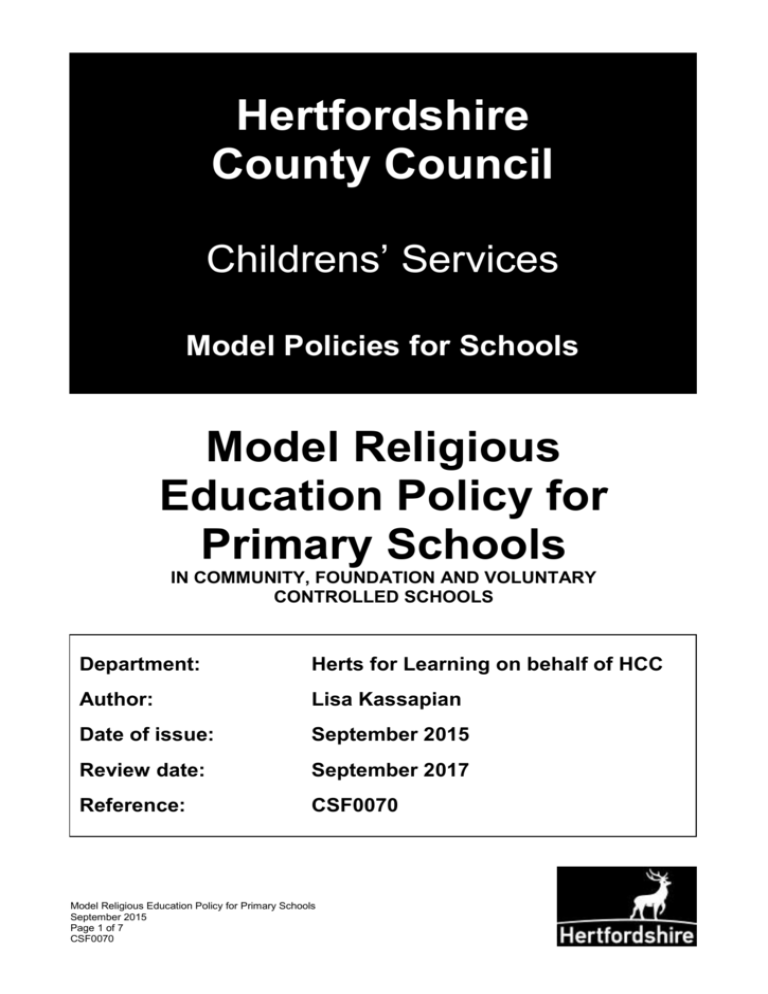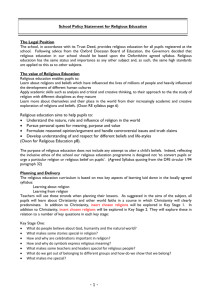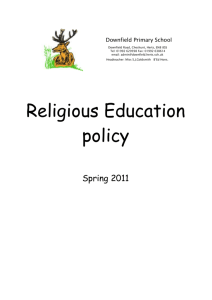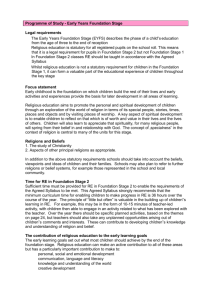cSF0070 Model religious education policy
advertisement

Hertfordshire County Council Hertfordshire Childrens’ Services Model Policies for Schools Model Religious Education Policy for Primary Schools IN COMMUNITY, FOUNDATION AND VOLUNTARY CONTROLLED SCHOOLS Department: Herts for Learning on behalf of HCC Author: Lisa Kassapian Date of issue: September 2015 Review date: September 2017 Reference: CSF0070 Model Religious Education Policy for Primary Schools September 2015 Page 1 of 7 CSF0070 RELIGIOUS EDUCATION IN COMMUNITY, FOUNDATION AND VOLUNTARY CONTROLLED SCHOOLS You are offered this model policy for your consideration. Please discuss and adapt the document according to your own unique local circumstances. POLICIES FOR LEARNING AND THE MANAGEMENT OF LEARNING BACKGROUND TO RELIGIOUS EDUCATION AT OUR SCHOOL Religious Education (RE) is not a National Curriculum subject, but must be taught to all pupils as part of the Basic Curriculum. As RE is not nationally determined the Local Education Authority must provide an Agreed Syllabus for us to follow. It is this Hertfordshire Agreed Syllabus of Religious Education 2012-2017 which we have used as the basis of our planning and delivery of RE (note 1). Families who send their children to this school are (delete/amend as appropriate) in the main ‘nominally’ Christian/ predominantly from nonreligious backgrounds/ from a range of faith backgrounds, including Hindu, Muslim, Jewish etc/ some children are from practising Christian families, in addition, there are children who are from religions other than Christianity and some from non-religious backgrounds. RE is concerned with “learning about religion” and “learning from religion” and it is not the practice of this school to preach to or convert the children. The faith background of both the staff and child’s family is respected at all times. Parents of a pupil at a community, foundation or voluntary school have a right to withdraw their children from religious education (RE). If a parent asks for their child to be wholly or partly excused from attending any RE the school must comply unless the request is withdrawn. Any parent who wishes this may consult the headteacher. Teachers may also withdraw from the teaching of RE (note 2). A. VALUES AND AIMS We believe at this school that RE both supports and strengthens what we aim to do in every aspect of school life. Our caring ethos and the value which we place on the development of the whole child; spiritually, morally, socially, culturally and intellectually is reflected in the RE curriculum. Specifically, RE at our school aims to enable pupils of whatever ability and level of development to: 1. acquire and develop knowledge and understanding of principal world faiths practised in Great Britain. These include Buddhism, Christianity, Hinduism, Islam, Judaism and Sikhism, each of which is represented in Hertfordshire; Model Religious Education Policy for Primary Schools September 2015 Page 2 of 7 CSF0070 2. develop an understanding of the influence of beliefs, values and traditions on individuals, communities, societies and cultures, including the local community; 3. develop the ability to make reasoned and informed judgements about religious and moral issues with reference to the teachings of the principal religions; 4. enhance their own spiritual, moral, social and cultural development by: a. developing awareness of the fundamental questions of life arising from human experiences, and how religious beliefs and practices can relate to them; b. responding to the fundamental questions of life in the light of their experience and with reference to religious beliefs and practices; c. reflecting on their own beliefs, values and experiences in the light of their study; d. expressing their own personal viewpoints in a thoughtful, reasoned and considerate way; 5. recognise the right of people to hold different beliefs within an ethnically and socially diverse society. B. OBJECTIVES Learning Religious Education provokes challenging questions about the ultimate meaning and purpose of life, beliefs about God, the self and the nature of reality, issues of right and wrong and what it means to be human. It challenges pupils to reflect on, consider, analyse, interpret and evaluate issues of truth, belief, faith and ethics and to communicate their responses. Religious Education should encourage all participants to reflect on their own beliefs and values and to acknowledge that others hold beliefs different from their own. Religious Education has two closely related aspects: Learning about Religion (AT 1) and Learning from Religion (AT 2) These two attainment targets with their associated statements set out the broad objectives in terms of knowledge, understanding and skills for the RE curriculum. RE is at its most effective when these two attainment targets are closely related in the learning experience. Model Religious Education Policy for Primary Schools September 2015 Page 3 of 7 CSF0070 AT1 Learning about Religion identify, name, describe and give an account, in order to build a coherent picture of each religion; explain the meanings of religious language, stories and symbolism; explain similarities and differences between, and within, religions. AT2 Learning from Religion respond to religious and moral issues in an informed and considered manner; reflect on what might be learnt from religion in the light of personal beliefs and life experience; identify and respond to the question of meaning within religion. Teaching Teaching the programmes of study should contribute to pupils' knowledge and understanding and provide opportunities for reflection on six key areas: Beliefs and teachings - e.g. stories, religious leaders, books, God/gods, self-sacrifice, truth, life after death; Religious practices and lifestyles - e.g. people, festivals, pilgrimages, places, events, artefacts, lifestyle choices, actions, effects on individuals; Ways of expressing meaning - e.g. sacred texts, art, music, literature, symbolism, poetry, dance, drama, prayer, forms of religious and spiritual expression, silence/stillness; Human identity, personality and experience - e.g. belonging, preferences, relationships within family and community, influences on own lives, inspirational people; Questions of meaning and purpose - e.g. amazement, sadness, disappointment, joy, awe, in connection with the natural world and life's journey, making sense, ultimate questions of life raised by life experiences; Values and commitments - e.g. values, ethics, principles, rules, morality. The teaching of RE seeks both to impart knowledge and develop understanding of religious experiences, feelings and attitudes through a variety of teaching and learning approaches. Providing a balance between these two key attainment targets underpins the teaching of RE at this school. Model Religious Education Policy for Primary Schools September 2015 Page 4 of 7 CSF0070 RE teaching specifically draws on the following: 1. visits and visitors; enabling children to see at first hand religious people, objects, symbols, places, events, stories and explore with people who have faith 2. role play; encouraging children to learn through familiar or unfamiliar settings and ask questions from their own encounters 3. artefacts; being able to explore items which are precious and/or used in religious worship, encouraging respect and questioning whilst deepening knowledge 4. parents; by valuing the family backgrounds of the children and making them part of the school community The teaching of RE will involve some direct teaching and whole class, group, paired or individual activities. A range of teaching styles will be used including enquiry, exploration, discussion, asking and answering questions, artefacts, visits and faith visitors, pupils are actively engaged in learning. ASSESSMENT, RECORDING AND REPORTING (see school Assessment policy) The Agreed Syllabus sets out a structure for recognising pupil achievements and each pupil can work progressively towards achieving the statements of attainment as outlined following the Eight Level Scale which is currently the requirement of the Hertfordshire Agreed Syllabus for Religious Education 2012-2017. Assessment in RE is seen in its broadest sense and is not limited to measurement and testing. (note 3). Through activities for example, discussion with pupils, group activities, marking and guiding their work, observing, displaying work, asking and answering questions, teachers are continually finding out about their pupils’ achievements. This information is then recorded against the statements of attainment in line with other areas of the curriculum. At this school we appreciate that a vital aid to learning is for pupils to be actively involved in their own assessment. As a staff we have undertaken moderation exercises to ensure that we are familiar with the statements and what they mean in the context of a pupil’s work. School reports are sent home in the summer term of each year and the RE report is written with reference to the records made or pieces of work retained. Model Religious Education Policy for Primary Schools September 2015 Page 5 of 7 CSF0070 TIME ALLOCATION In line with the requirements of the Hertfordshire Agreed Syllabus of Religious Education 2012-2017 we plan to for RE will be delivered flexibly according to the statutory requirements of the EYFS at Foundation Stage. At Key Stage 1 pupils spend 60 hours over 2 years (approximately 10 hours per term) and 156 hours over 4 years (approximately 13 hours per term) at Key Stage 2. Time allocation does include visits and RE curriculum days but not school productions related to festivals or collective worship time. (See Collective Worship policy). PLANNING In order to ensure that our aims are met and the Programme of Study is covered at each key stage the school follows the Hertfordshire Primary Scheme of Work for RE which builds-in coverage of and progression in both the content and concepts outlined in the Agreed Syllabus. This scheme shows how we have planned that pupils have learned about and from “the six principal religions through the EYFS and Key Stages 1 and 2”. We have used a combination of teaching RE through the creative curriculum, RE days and as a separate subject, depending on the material which has to be covered. Option for mixed aged classes:- Our medium-term plans give details of each unit of work for each term. The RE Subject Leader keeps and reviews these plans on a regular basis. As we have some mixed-age classes, we carry out the medium-term planning on a two-year rotation cycle. By so doing, we ensure that children have complete coverage of the Agreed Syllabus but do not have to repeat topics. Short term planning of individual lessons is a matter for the class teacher. The RE Subject Leader is available to help with this and keeps a range of teacher’s resources as a guide. (When planning each unit of work the teacher will identify which parts of the programme of study are to be the focus, the learning objectives for the unit, the learning tasks planned to achieve them, time allocated and any resources, visits or visitors needed. The work planned must be relevant to the needs of the pupils). CROSS CURRICULAR ISSUES RE teaching and learning will be the means to many wider cross-curricular themes and dimensions. There are clearly very special opportunities to explore multicultural and equal opportunities issues and for consideration of the environment. Moral questions will be raised and pupils will develop a sense of citizenship through many aspects of the explicit RE curriculum. Links will be made with people and communities within the locality. Model Religious Education Policy for Primary Schools September 2015 Page 6 of 7 CSF0070 Children’s skills in oracy and literacy will be enhanced. Problem-solving, decision-making and interpersonal skills will be developed. LEADERSHIP AND MANAGEMENT The RE subject leader manages this area of the curriculum in line with our job description for subject leaders. There is a yearly staff meeting on RE, led by the subject leader; where areas for development are discussed. This policy is reviewed at that meeting to ensure it still represents the values and practice of the school. NOTES 1. Voluntary Controlled schools should follow this pattern Voluntary Aided schools are not obliged to use the Agreed Syllabus. They must, however teach RE in accordance with their trust deed. 2. DFE Circular 1/94 paragraphs 44-49. 3. See Hertfordshire Agreed Syllabus 2012-2017 pages 33-37. The Eight Level Scale of Attainment. Model Religious Education Policy for Primary Schools September 2015 Page 7 of 7 CSF0070









